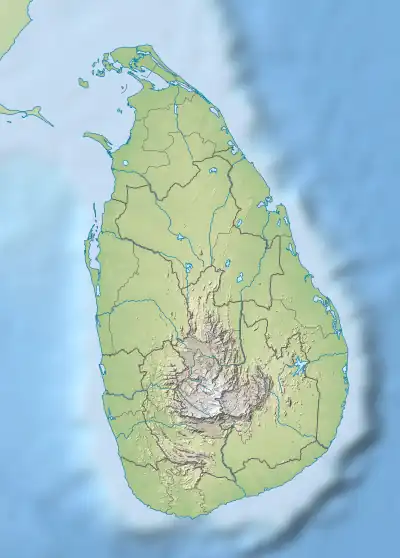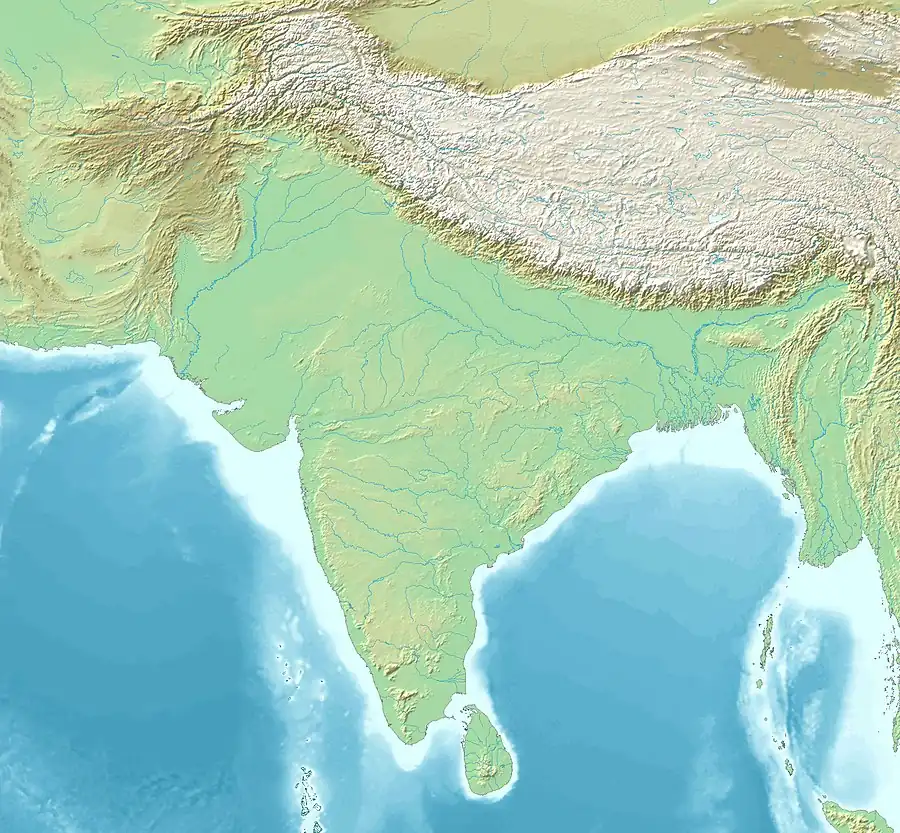Central Highlands of Sri Lanka
Central Highlands of Sri Lanka is a recognised World Heritage Site in Sri Lanka. The site comprises the Peak Wilderness Protected Area, the Horton Plains National Park and the Knuckles Conservation Forest. These are rain forests, where the elevation reaches 2,500 metres (8,200 ft) above sea level. The region harbors a variety of mammal species including the bear monkey, Trachypithecus vetulus monticola, (a subspecies of purple-faced langur) and the Horton Plains slender loris, Loris tardigradus nycticeboides, (a subspecies of red slender loris).[1]
| UNESCO World Heritage Site | |
|---|---|
 Peak Wilderness encompasses the Adam's Peak | |
| Location | Sri Lanka |
| Includes |
|
| Criteria | Natural: (ix), (x) |
| Reference | 1203 |
| Inscription | 2010 (34th Session) |
| Area | 56,844 ha (140,460 acres) |
| Buffer zone | 72,645 ha (179,510 acres) |
| Coordinates | 7°27′N 80°48′E |
 Location of Central Highlands of Sri Lanka in Sri Lanka  Central Highlands of Sri Lanka (South Asia) | |
This is the first Sri Lankan World Heritage site to be designated in 22 years, since the Sinharaja Forest Reserve was enlisted in 1988.[2] Originally submitted for inscription as a mixed cultural and natural site, the Committee recognized only the natural values of the site.[3] On 31 July 2010, the World Heritage Committee holding its 34th session in Brasília inscribed Central Highlands of Sri Lanka and Papahānaumokuākea of Hawaii as new World Heritage Sites.[4]
Sites
The Sri Lanka montane rain forests represent the montane and submontane moist forests above 1,000 metres (3,300 ft) in the central highlands and in the Knuckles mountain range.[5] Half of Sri Lanka's endemic flowering plants and 51 percent of the endemic vertebrates are restricted to this ecoregion. This ecoregion is inhabited by five strict endemic mammals and eight near-endemics. The ecoregion also harbors five strict endemic bird species and 20 near endemics.[5] The site incorporates three protected areas;
Peak Wilderness Sanctuary is a sanctuary of 22,380 hectares (86.4 sq mi) of land area, which was established on 25 October 1940.[6] Horton Plains National Park adjoins the eastern boundary. Horton Plains National Park has been originally designated a nature reserve on 5 December 1969 later elevated to the national park status on 16 March 1988. Knuckles mountain range is situated to the northeast and its relict, endemic flora and fauna is distinct from montane forest of central massif.[5]
References
- Rodrigo, Malaka (8 August 2010). "Lanka's central highlands win heritage battle". The Sunday Times. Retrieved 8 August 2010.
- Sirimane, Shirajiv (1 August 2010). "Central Highlands, a Natural World Heritage". Sunday Observer. Retrieved 1 August 2010.
- "Hawai'i and Sri Lanka added to the World Heritage List". IUCN. 31 July 2010. Archived from the original on 7 August 2011. Retrieved 1 August 2010.
- "World Heritage Committee inscribes two new sites on World Heritage List". unesco.org. UNESCO. July 30, 2010. Retrieved 1 August 2010.
- "Sri Lanka montane rain forests". Terrestrial Ecoregions. World Wildlife Fund. Retrieved 1 August 2010.
- Green, Michael J. B. (1990). IUCN directory of South Asian protected areas. IUCN. pp. 234. ISBN 2-8317-0030-2.
IUCN directory of South Asian protected areas.